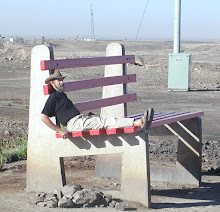Monday, 31 May 2010
Scientists don't always know best
Charlatans make false alternative therapy claims they know to be false, in order to get money or social standing. Dupes make false alternative therapy claims they believe to be true, in order help people, to get money and/or for social standing. Sadly charlatans and dupes make up the overwhelming majority of alternative therapy adherents, both customers and purveyors.
Charlatans make false alternative therapy claims they know to be false, in order to get money or social standing. Dupes make false alternative therapy claims they believe to be true, in order help people, to get money and/or for social standing. Sadly charlatans and dupes make up the overwhelming majority of alternative therapy adherents, both customers and purveyors.
The number of alternative therapy adherents actively engaged in scientific research to prove or disprove the utility of these therapies, or to outline their conditions of efficacy, is miniscule. Worse, the majority of adherents tend to view these rare heroes as somehow motivated by ill will and to label their (replicable) findings as bias. Odd, that.
It could well be that there is a large number of scientifically rigorous folk researching alternative therapies, but not writing about it. There could be a significant proportion of alternative therapy proponents who do not believe any of the false claims - using only those alternative therapies that have been replicably verified - but who contribute no articles and join no blog discussions. Shall we try to design a rigorous test to determine this question?
here_and_there in reply to had_it
"Sadly charlatans and dupes make up the overwhelming majority of alternative therapy adherents, both customers and purveyors." That made me smile. "Overwhelming majority"? Where is your data to support this rather sweeping claim? It often happens that people who recommend a scientific approach are anything but rational in their criticism of alt therapies.had_it in reply to here_and_there
You are quite right. I have no scientifically verifiable evidence for my contention about the overwhelming majority, it is based on anecdotal evidence: ads, articles, letters, third-party books such as "Bad Science" and the blogosphere, such as these pages.It could well be that there is a large number of scientifically rigorous folk researching alternative therapies, but not writing about it. There could be a significant proportion of alternative therapy proponents who do not believe any of the false claims - using only those alternative therapies that have been replicably verified - but who contribute no articles and join no blog discussions. Shall we try to design a rigorous test to determine this question?
here_and_there in reply to had_it
The only point of such a test would seem to be for the purpose of including such therapies on the NHS, which I do not see happening in the medium term future. Until then the only test is to try the therapy/ist for yourself, and if you are pleased with the results, carry on. If not, stop going. If a therapist claims he can cure X, and then fails to do so, then you revise your opinion of him. It is your money and you are responsible for your actions. I can't see what all the fuss is about.had_it in reply to here_and_there
I think the fuss is about the venality of the charlatans and the gullibility of the dupes. Snake-oil salesmen have been with us for thousands of years. (Though my favorite was the US legislator who made millions selling Hadicol: "well, I hadda call it sumpin.") Indeed, all physicians were snake-oil salesmen until very recently: folks used to pay to be bled when struck with any illness. And they selected their physicians in much the way you suggest, trial and error - or reputation. As medicine started to be treated as a science, rather than as a barber's sideline, professional qualifications, licencing, boards of inquiry and the concept of being "stuck off" followed. I think the fuss is to see the same standards applied to alternative therapists. Many think that allowing anyone who can afford a snake or a bleeding lance to practice "alternative medicine" is dangerous, possibly criminal.
Subscribe to Comments [Atom]

Post a Comment